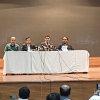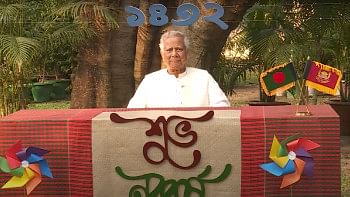Bangladesh deserves better leaders. How do we find them?

Something shifted in the air after the recent Bangladesh Investment Summit. The conversations were ambitious, the energy palpable. But what stood out most wasn't a policy announcement or a foreign pledge—it was a silent, growing consensus about the kind of leadership this country truly needs to move forward.
For the first time in a long time, it felt like the room was full of possibility not just because of capital or contracts, but because of people. We witnessed a different calibre of leadership—individuals who were confident without being arrogant, educated without being elitist, and globally fluent without losing their connection to the land they came from. And perhaps for the first time in decades, Bangladeshis collectively began to see what our politics could look like if the right people were given the platform to lead.
That's when something quietly but powerfully emerged—a new paradigm of leadership. Let's call it "the Ashik Chowdhury paradigm."
Now, this isn't about one man or one speech. It's a symbol. A representation of a deeper national yearning. It reflects a growing impatience among the people—especially the youth—with the old ways of doing politics. Bangladeshis are no longer interested in leaders chosen solely because of dynastic ties, blind party loyalty, or how loudly they can cheer during parliamentary sessions. They are asking harder questions like: who really speaks for us? Who is equipped to take our voices to Geneva, to New York, to regional trade summits and global climate tables?
We are no longer a country defined only by its past. We are one of the fastest-growing economies in South Asia. We are building expressways, launching satellites, exporting digital services. Yet, our politics still feels trapped in the 1980s—a theatre of loyalty contests and generational entitlements. Something doesn't add up.
The truth is, we need new blood. And not just young blood, but fresh blood. Educated, ethical, globally aware, and deeply rooted in the everyday realities of ordinary Bangladeshis. We need leaders who understand policy, who speak truth with compassion, and who can transition seamlessly from a village gathering in Gaibandha to a high-level forum in Brussels. That standard is not impossible. We have seen glimpses of it. And once you see it, you can't unsee it.
There is no lack of qualified people in this country. We have young lawyers, doctors, academics, economists, climate scientists, and tech innovators—many of whom are already contributing to national development in significant ways. The private sector has embraced these talents. So has civil society. Even international organisations have begun hiring Bangladeshi professionals at senior levels. Yet, our political institutions remain largely closed off to them.
Why? Because the current political structure is designed not to empower leadership, but to preserve control. It prioritises obedience over originality, visibility over vision, and loyalty over learning. It is a system built to maintain power, not to distribute it wisely.
This is where the old guard must be challenged—not disrespected, but challenged. The generation that led us through independence and beyond deserves our respect. They built a nation from scratch. But that struggle belongs to a different time. Today, our challenges are more complex: climate resilience, digital governance, geopolitical alignment, inclusive urbanisation, youth employment, gender justice. These require leaders who not only understand policy, but also understand the world.
To navigate these new realities, we need leaders who are neither afraid of intellect nor threatened by questions. We need leaders who don't see fluency in English as elitism, but as a necessary tool for diplomacy and international negotiation. Parliament must be a house of ideas, not applause; of serious scrutiny, not performative loyalty.
There's a strange discomfort in our political culture with the word "education," as if being educated somehow makes one disconnected or "foreign." But what is politics if not the most complex, demanding job of all? If we expect qualifications from our engineers, teachers, and doctors, why not from our lawmakers?
An MP is not just a local powerbroker. They are legislators. They pass laws that affect 170 million lives. They represent us in international treaties, multilateral organisations, and global debates. How can we expect them to function without the tools required for that job?
In the 1970s, many of our national leaders came from humble backgrounds with little formal education. And yet, they led with vision and moral clarity. That was a different era. Today, we don't have the luxury of improvisation. Our politics must become professional, structured, and intellectually rigorous. Not because we want to imitate the West, but because the stakes are too high to keep winging it.
Education is not about English fluency or fancy degrees. It's about critical thinking, problem-solving, and the ability to understand complexity. It's about integrity, perspective, and the discipline to listen and learn. We must stop framing educated leadership as a threat to grassroots connection. The two are not mutually exclusive—they are necessary complements.
One of the more insidious problems in Bangladeshi politics is the entrenchment of dynastic control. Political legacies are passed down like family heirlooms, not earned through merit or public service. This not only blocks fresh talent—it fosters a dangerous sense of entitlement among political heirs.
Of course, political experience within families isn't inherently bad. Many sons and daughters of political leaders grow up understanding governance deeply. But when bloodline becomes the only qualification, it signals decay. It tells young people that unless they are born into power, they can never access it. That message is corrosive to democracy.
If political parties are serious about representing the people, they must start building platforms for merit-based entry. They must engage universities, professional associations, and civil society in leadership scouting and development. Internships, shadowing opportunities, debates, and policy boot camps should be part of every party's outreach programme.
The next prime minister should not be chosen in a backroom negotiation or born into the role. They should rise through public trust, competence, and clarity of vision. The future of this country depends on that shift.
One of the most tragic ironies of our political structure is that we have a functioning parliamentary democracy on paper, but not in practice. Parliament should be a sacred space of disagreement, dialogue, and lawmaking. Instead, it often resembles a battleground of party dominance, with real policy discussions drowned out by slogans and shouts. Opposition is painted as treason. Dissent is punished. And backbenchers are expected to clap, not challenge.
This is not democracy. This is theatre. The people of Bangladesh deserve more. We deserve MPs who speak not just to cameras, but to constituents. Who spend time reading bills, visiting schools and clinics, listening to farmers and factory workers. MPs should be researchers, facilitators, and visionaries—not just carriers of party lines.
The speaker's office, too, must evolve. It should be an impartial guardian of parliamentary integrity, ensuring that every voice is heard, and every perspective debated. Real-time fact-checking, public scorecards, and constituency accountability reports should become standard tools in the political ecosystem.
The final transformation must be cultural. Politicians are not our masters. They are our employees. They don't rule us. They serve us. This mindset shift is already happening at the grassroots. People are more informed, more connected, and more assertive. They are no longer content with being spoken at—they want to be spoken with. They want transparency, access, and accountability. And they are willing to demand it.
Gone are the days when politicians could rule from a distance. Today's citizens want leaders who walk with them, speak like them, understand their struggles, and make decisions with heart and reason. They want leaders who show up—not just during election season, but all year round.
This is the moment. A new political awareness is blossoming in Bangladesh, and it's unstoppable. Anyone who ignores it—any party that tries to suppress it—will be left behind. To move ahead, we must reform our political institutions and reimagine the very architecture of leadership in the country. Political education must be integrated into our academic and civic life. Schools and universities should teach young people not just how to vote, but how to lead.
Party constitutions must change to enforce internal democracy. Campaign finance must be regulated to prevent the influence of black money. Media freedom must be protected so journalists can hold power accountable. And digital tools must be used to enhance—not manipulate—democratic participation. Most of all, we must stop celebrating survival and start demanding excellence. Our future depends on it.
Kollol Kibria is an advocate, human rights activist, and political analyst. He can be reached at [email protected].
Views expressed in this article are the author's own.
Follow The Daily Star Opinion on Facebook for the latest opinions, commentaries and analyses by experts and professionals. To contribute your article or letter to The Daily Star Opinion, see our guidelines for submission.

 For all latest news, follow The Daily Star's Google News channel.
For all latest news, follow The Daily Star's Google News channel. 











Comments